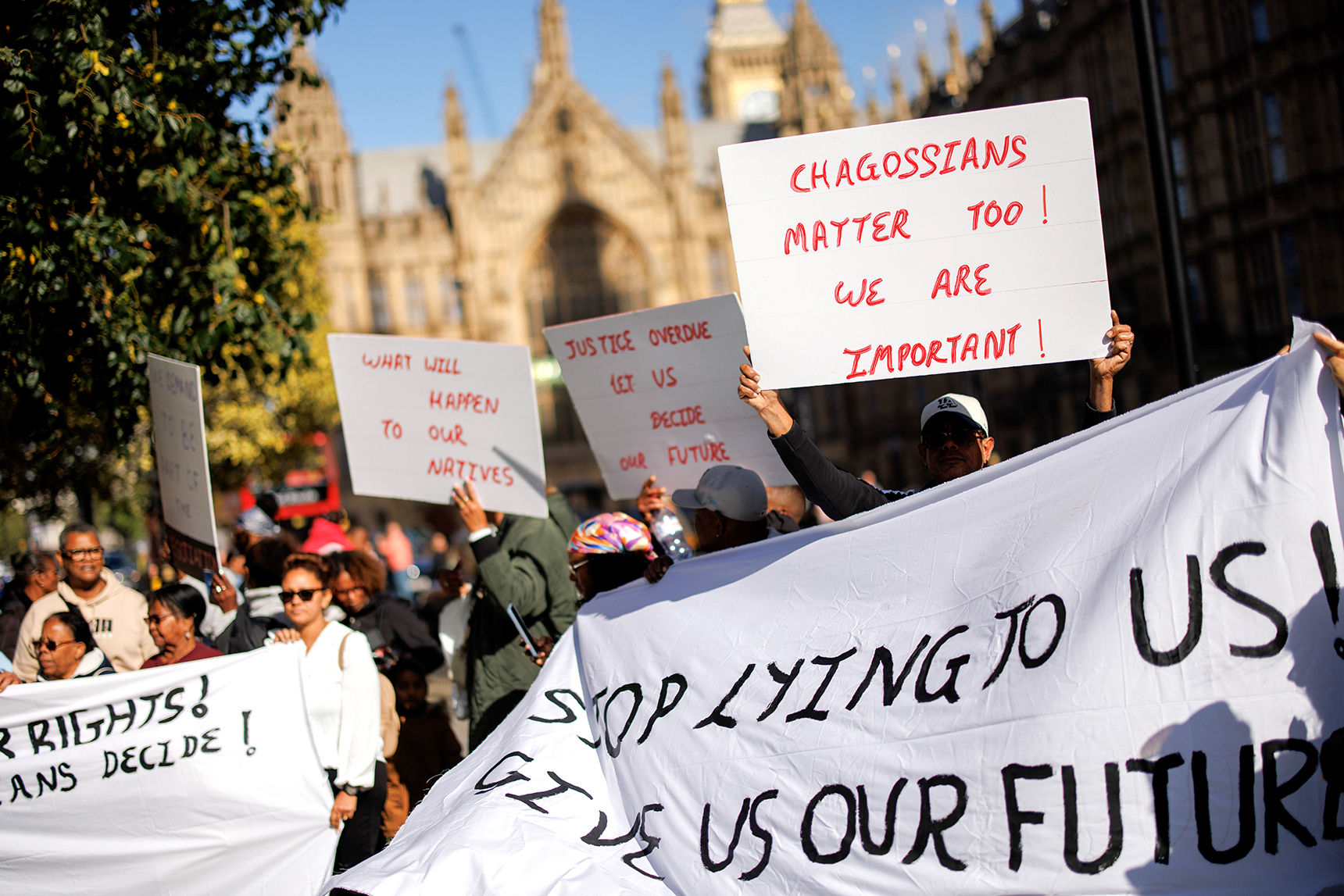The announcement by the new UK Labour government that the Chagos Islands are finally to be handed back to Mauritius exposes, once again, the nostalgia that still grips large parts of the British public. Many are unable even at this late stage to accept the loss of empire.
At the recent Tory Party conference, for example, every candidate vying to become the new Conservative leader also vied to outdo their rivals in denouncing, with variations of imperial bluster, the “surrender” of Britain’s last African colony. The former Home Secretary, James Cleverly, playing to the converted, angrily thundered, “weak, weak, weak”.
This was perhaps a fitting finale to the long saga of British duplicity over the Chagos Islands. It was James Cleverly himself, then the Conservative Foreign Secretary, who had opened negotiations to hand the islands back to Mauritius.
In 2022, Cleverly declared that he hoped the discussions would be completed by early 2023. But by October 2024, no longer in office, the former minister suddenly discovered that this was a craven act of post-imperial defeat. The current Tory shadow foreign minister even bleated about giving away “a key strategic military asset” that would provide “succour to our enemies”.
Of course, they all know their fulminations to be spurious blather, but it shows that Empire posturing is still de rigueur in right-wing British politics. Their rhetoric also reveals a cynical assumption that much of the UK electorate is so gullible that they will still swallow such Ruritanian absurdity.
In fact, Britain handed back sovereignty to Mauritius in 1968 but excluded the 60 islands that constitute the Chagos Archipelago. All Chagossians were forcibly removed.
The motive was to retain the island of Diego Garcia as a military base. Diego Garcia has been a joint US-UK airstrip in the Indian Ocean for 56 years, and with the new arrangement in place the US has been given a further 99-year lease.
Clueless
This didn’t stop Tory MP’s and right-wing pundits harrumphing about “selling out”. One London Guardian columnist observed, “Just last Wednesday, you could have put money on most MPs being totally clueless about the exact location of the Chagos Islands. Are they east, west, south or north of Mauritius? To be in with a shout, you have to know where Mauritius is. And most MPs wouldn’t get within 500 miles. The Indian Ocean is bigger than you think.
“And don’t get them started on Diego Garcia. Surely he’s the younger brother of the titular character in the 1974 Sam Peckinpah film Bring me the Head of Alfredo Garcia.”
This has been a long saga redolent of racism and condescension. In 2010, one senior British official dismissed the banished Chagossians as “Man Fridays and Tarzans”.
That attitude is mirrored in the British record of breathtaking duplicity, vividly chronicled by celebrated human rights lawyer Phillipe Sands in The Last Colony: a tale of exile, justice and Britain’s colonial legacy (2022). It is a grim tale of British perfidy.
Sands, the author of the acclaimed memoir, East West Street, represented Mauritius in its long fight to regain the Chagos Islands. In his book, he records the parliamentary declaration by then Foreign Secretary James Cleverly in 2022, promising “to secure an agreement on the basis of international law”, taking account of “relevant legal proceedings”.
It was a polite way of admitting that Britain was not offering an olive branch to Mauritius from any sense of honour or decency. The UK had been brought to this point by relentless international pressure and adverse legal judgments.
These include negative verdicts from the International Court of Justice in 2019 and the International Tribunal for the Law of the Sea in 2021. Human Rights Watch concluded that the forced deportation of the Chagossians “amount to crimes against humanity that continue to the present”.
‘Weak, weak, weak’
Naturally, none of this was mentioned by former Minister Cleverly when he slammed the very agreement he had initiated as “weak, weak, weak”.
This year marks the centenary of the greatest extent of the British Empire, spanning one quarter of the globe, celebrated in the vast 1924 British Empire Exhibition at Wembley. Attracting 27 million visitors and described by The Times as “a true shrine of Empire”, the festival was designed to showcase the astonishing fact that in 1924 Britain held sway over 400 million people in 58 countries across the globe, seven times larger than the Roman Empire at its peak.
A hundred years later, the long fallout from empire still lingers.
Consequently, this new agreement over the Chagos Islands is unlikely to close the final chapter on Britain’s Indian Ocean venture. For with Diego Garcia leased to the US for another 99 years, the UK will remain hostage to Washington’s own neo-colonial ambitions or military whims until 2123.
From imperious overlord to junior partner is a bitter pill to swallow. But no amount of nostalgia or deceitful bluster will put His Majesty’s lost Empire together again. DM
Bryan Rostron has worked as a journalist in Italy, New York, London and South Africa, writing for Business Day, Daily Maverick, The New York Times, The Guardian, The Spectator, and Private Eye. He was the South African correspondent for the New Statesman and is the author of six books including Robert McBride: The struggle continues, The Ranter’s Guide to South Africa and a novel Black Petals.





